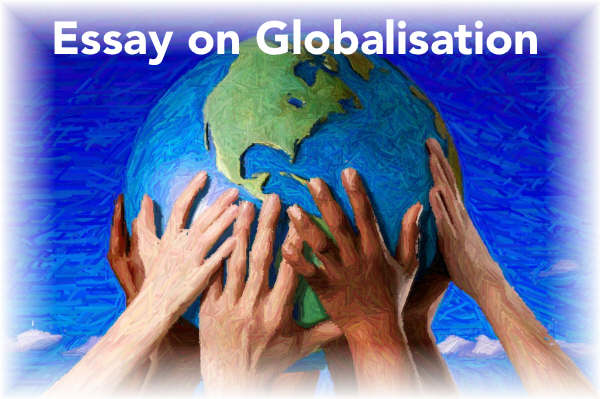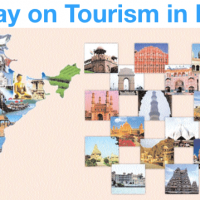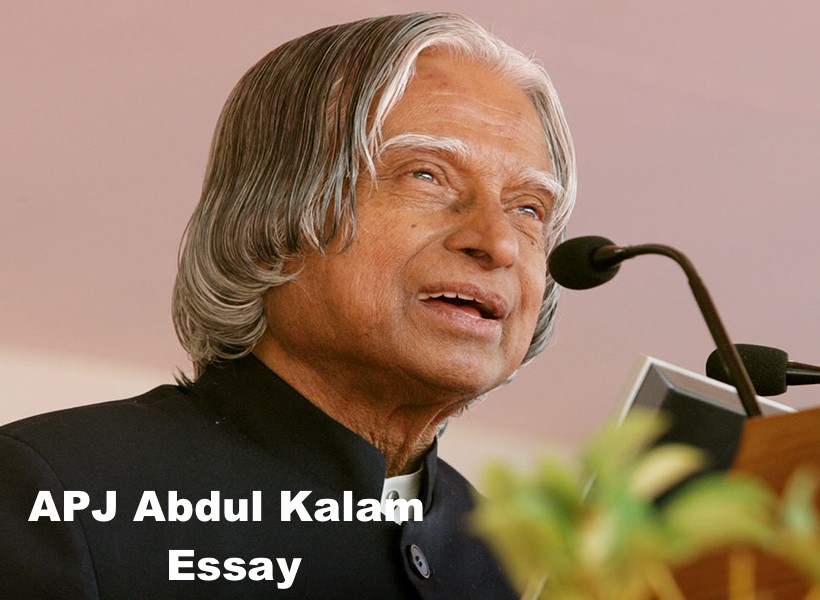Hello Friend This is special category for our small reader who study in school. If they looking for english essay for their school homework or any kind of english essay article then this special category might help you all guyz. in this article we will share Globalisation Essay in English for all class children and student . Initially we have published 300 word and 1000 word article for Globalisation.
Essay on Globalisation in English

The way the word globalisation is referred to these days it makes one wonder if it is some thing new and unheard of. That however is not the case The word might evoke concerns of var ious kinds in various minds but as a concept it is not new Only the thrust is new The fear that it could lead to economic and therefore political hegemony of some is also misplaced. It can lead to no such hegemony whether in physical or in ideological form if we understand the underlying spirit of globalisation.
Economic globalisation was practised by our ancestors too. Simply understood, it is the concept of one globe one market. Earlier to0 when the civilisation was in its cradle, people did business with people from all over the world. The only constraint then was the establishment of contact. There was no business taboo of any kind. The only issue was of how to reach all parts of the world. Man by nature is nomadic.
It is this nature of mankind that has made civilisation or globalisation a possibilityIf man were not a nomad, the world would not have made the kind of progress it hasThe greatest example of this is the United States of America. There are fewer original Americans than those who settled there from different parts of the globe and made America their home This is the effect of globalisation with a difference This globalisation that we are discussing now is different from the one just cited above because this globalisation deals mainly with trading relations and activities with all barriers dismantled.
This globalisation is as old as history of mankind, beginning with the great migrations (man is nomadic by nature he will settle any where in pursd it of livelihood) of people across the great land mass. But the process in the past was slow and fraught with risks and dangers Risks and dangers never inhibited man from the pursuit, but speed was certainly an important factor. But today we live in a different world.
The technology has made it possible to reach out to any part of the globe in a jiffy Communication has become so fast that we and our products can reach any part of the globe without any difficulty at all. This has lent a new mean ing to globalisation. The globe has truly become squeezed into a ball. Globalisation derives special meaning and content from this fast and subtle means of communication.
This need not be seen as a disadvantage even if for the time being we are not able to match the ability of some nations in providing cheap and easy merchandise For in stance, China has flooded our local markets with their goods It may be a momentary setback, but in the long run it may and it should prove beneficial. It is a challenge to our ingenuity to produce better merchandise at a lesser cost.
Globalisation is expected to generate the spirit of competition which is so important in todays liberalised economyIf it were not for globalisation, our information technology would not have made an inroad into the world market.
Today we are the best and the most sought-after IT providers in the world. It has given a fillip to our economy and it has provided better job opportunities to our own wards that have excelled. They have excelled thanks to globalisation Today’s world is so well connected that it is no longer possible to remain isolated from one another.
We can no longer stay shielded from the impact of what happens in other parts of the world. If 9/11 happened in the US, it impacted the entire world. If Tsunami happened in the Andaman and Nicobar Island sit impacted the other parts of the world as well. 26/11 happened in India, but several other countries were impacted by it and are still feeling the heat of the sameThe economic slowdown that began in the US and Europe has left every country of the World affected.
Globalisation is both a process and a phenomenon. The two will have to be understood in their entirety. Breaking down of distances measured by time is an important factor and it is a phenomenon that marks globalisationThis phenomenon far from getting slowed down will fur there intensify as we make more technological advances We have to live with this phenomenon.
In fact, we should adjust ourselves expeditiously with this phenomenon so that we can reap the benefits that would accrue there from. Adjusting to these technological advances is what we call process.
This process has to be continual if we are to constantly reap the benefits of globalisationIt is a never-ending process it is a dynamic process. Each country of the world is a part of this process and it must be the endeavour of each one of them to ready itself to meet the challenges and opportunities provided by these challenges -so that it is not bypassed by the massive institutional and technological changes that are taking place so rapidly.
Globalisation as a process is expected to absorb these changes. To expect that globalisation as a process will have the same and equal impact on all parts of the world will be expecting too much Nothing can ensure uniformity There are various rea sons for that.
Much of it depends on the absorption capacity of each nation and that usually depends on the economic structure and political frame and Work of individual countries besides the entrepreneurial traits of the citizens of the countriesNo two countries are identical in their economic structures political patterns and in entrepreneurial skills Market mix also varies from state to state and from country to country making uniformity a distant dream
However, it is no longer possible to remain insulated from the rest of the world. Today it is possible to have a common thread running through all economic systems. While this will enable us to enjoy the fruits of a multi-civilised world, it will also expose us to the attendant risks. That is the quintessence of globalisation which we must be ready to countenance.
Also Read:
- Essay on Pollution in English
- Village life Essay in English
- Essay on Myself in English
- Essay on My Best Friend
- Essay on My School
- Essay on Family in English
- First Day at School Essay
- Corruption Essay in English
- Women Empowerment Essay
- Republic Day Essay
- Mahatma Gandhi Essay
- Essay on Global Warming
- APJ Abdul Kalam Essay
- Diwali Essay in English
Essay on Globalisation in English
Today, when we open the newspaper in the morning, we read bout strikes, more than anything else. Sometimes, the factory workers, Sometimes the students, sometimes the teachers,Sometimes the doctors, the engineers and even the lawyers are on strike. The shopkeepers, the chemists, the petrol pump dealers, the journalists, the employees of all departments, the bus drivers and the conductors all go on strike for one reason or the other.
The particular strike which had in it the portents of a gathering storm as a newspaper reported about it, was held on 11th May, 2000. It was a general strike and was expected to have an impact at all-India level. But, it appeared, it had not been quite successful and even the media did not give it much coverage.
However, the strike mentioned above, was important and a noticeable incident for many reasons and from many angles. For one thing, the strike was near total in several states, mostly ruled by the opposition, likeKerala, Bihar, Tripura, West Bengal and Assam. As per expert estimated, the strike heralded the return of the trade union to the centre stage after a long period of hibernation.
The most significant fact about the said strike was that apart from bank employees, and employees of the insurance sector, even Workers and employees of the unorganised sector and the small Cale industry and the peasantry, youth and women participated in the strike.
It must be noted that evert in a number of advance developed countries like England, France and the USA, the, and trade unions are on the march. One can say they have come out of their hiding and are on the streets. In the said strike in India, more than 25 million peon reported to have participated. We learn in British history five hundred years ago, there was a Peasants Revolution which one lakh peasants (a very large number at that time) converse London demanding their rights. Their famous slogan was- “When Adam delved and Eve span, Who was then the gentleman?”
Apparently, the Peasants’ Revolt failed, as it did not show any immediately palpable results. But the later history of England has proved beyond doubt that it had actually not failed. It was a revolutionary revolt and revolutions never fail; their results can at the most only be postponed or delayed.
We should never forget the French Revolution and the Reign of Terror it brought in its train towards the end of the eighteenth entury. Nor can we ignore the great Bolshevik Revolution in Russia. In India strikes are not powerful enough or matchable to any of the revolutions like the French or Russian Revolutions Still, their significance must not be lost sight of.
The ostensible reasons for strikes or protests are often the steep rise in prices of essential commodities, widespread unemployment, privatisation of banking and insurance, withdrawal or reduction of subsidies etc. But one common point in all this was the privatisations and difficulties faced by the common man, particularly the low income groups as a result of globalisation and privatisation.
It is indeed deplorable that whereas globalisation has prosperity to some, it has brought, all-the-same, misery R Probably the governments all over the world, (including the one in have been too hasty, thoughtless and unfarsighted in properly implementing the idea of one economic work. They haven’t much bothered about the interests of the Common men, particularly those belonging to the weaker Sections of society. Consequently, Scenes of protests have already been witnessed in the USA and Thailand. In the latter case, the outgoing chairman of World Trade Organisation was even hit and attacked. Even if it is argued that globalisation is now irreversible and the teething troubles are bound to be there, our government must take some concrete steps to mitigate the lot of the poor. At the same time, we must not put all the blame on the government. Even if some people may consider the government a devil (which a popular government may possibly not be), the saying is that “the devil must be given his due.”
We must not forget that the government have started several schemes for the poor in the matter of housing, food, health, employment, education, etc. Some poor people are really benefiting from such schemes. Let others also avail themselves of them. There is no doubt that a wide-spread corruption hinders greatly the process of poverty alleviation. It is the duty of all concerned to bring to the notice of the Intelligence and Vigilance authorities all the corrupt elements that are eating into the vitals of our society. Thus much more alertness and vigilance on the part of the ‘Common people is required. Only then the desired money meant for _he poor can reach them. Otherwise, Rajiv Gandhi’s observation That every rupee meant for the Schemes for the poor gets frayed ‘Continuously such that when it reaches the really deserving Section ‘0f society only fifteen paise are left of it. Let the government officials also give up their lethargy and work hard for national uplift to help One and all in our country
It is true that globalisation is a double-edged weapon. It has both plus and minus points of world trade and now world to the other, A॥ red. The developing • that those countries that task of research, Can । 174
Globalisation has opened the doors of world trade and now, goods can move easily front one part of the World to the, kinds of technology is getting easily transferred, The deva, Countries have gained a lot in the Sens that those count cannot afford to go in for long and arduous task of research, the benefit of such research front developed countries. The developed Countries gain in the sense that they can easily sell their product the entire world and easily find out the takers and those who are ready to pay the maximum price.
India can gain immensely in the field of bio-agriculture particular. The genetic engineering is something which has to stay If we study the scenario carefully we can realize that it is the developed countries that are the greater gainers in this game. It is only they who can manufacture more and more qualitative products in large quantities. Hence the multinational companies with new technology and flushed with funds to flood the market have entered the arena in our country.
According to Laxmi Sehgal, whom Netaji characterised as the new Jhansi Ki Rani’ and who was the left parties’ candidate in the presidential election, “The worst thing is we are now allowing foreigners to enslave us economically. The conglomerates are servicing the vested interests of a few rich businessman and politicians. Today the big companies are spreading their tentacles, tomorrow they will be interfering in every decision-making process of the country.Just like the British rule in India which had its root the East India Company.
If this is not stopped, our economy will Soon foreigners. They will be dictating our annual national budget, our economy will soon the controlled by will be the ultimate disaster. In the 20th century We were slaves to the British our annual national budget. That | the British. I hope we don’t become economic slaves) the 21st century.”





